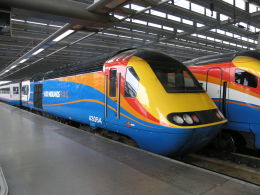Posted 7th December 2011 | 6 Comments
East Midlands Trains losses trigger DfT subsidy

STAGECOACH GROUP has begun to receive subsidy from the Department for Transport after racking up losses on East Midlands Trains. Stagecoach said the government support would mean that EMT would return to profitability in the second of half of the current financial year.
The EMT deficit has contributed to a general loss on Stagecoach's rail operations in Britain of £6.9 million for the first six months of the financial year 2011-2012, which is revealed in its interim results.The new EMT subsidy will be coming via the 'cap and collar' mechanism which had been standard in franchises agreed over the past few years, although it is set to be abolished in new contracts in favour of a straight profit share.
Under cap and collar, the Department takes the lion's share of most profits if they are higher than expected, but it is also liable to pay subsidies if they come in under the predictions of the franchise business plan.
Because EMT revenue has been lower than expected, and most costs have risen, the operating margin for Stagecoach rail has declined from a positive 4.4 per cent in 2010 to minus 1.2 per cent now.
The company said: 'The net amount paid to the DfT by our two rail franchises, which includes revenue support payments received at South Western Trains, has increased at a faster rate than revenue, as actual revenue growth has not been as high as was expected at the time the franchise contracts were awarded. Rolling stock costs have a large fixed element which is not subject to inflationary increases and therefore decrease as a proportion of revenue as revenue grows.
'Network Rail charges as a proportion of revenue have decreased as revenue growth has been higher than the inflationary increase in these costs, along with changes in the amount of performance regime income received. Traction energy costs have increased broadly in line with the rate of revenue growth, though higher diesel cost rises [mainly affecting East Midlands Trains] have been offset by lower electricity for traction costs [on most South West Trains routes].
'Staff costs have in general seen inflationary increases, along with some savings from more efficient use of staff, which has resulted in staff costs growing at a lower rate than revenue.'
Apart from the two rail franchises, Stagecoach also owns 49 per cent of Virgin Rail Group and has extensive bus operations in Britain and the United States.
The Group's total revenue for the six months ended 31 October 2011 was £1,293.7 million (2010: £1,133.6 million). Total operating profit (before intangible asset expenses and exceptional items) was £106.2 million (2010: £124.7 million). Earnings per share before intangible asset expenses and exceptional items were 10.1p (2010: 12.2p).
Reader Comments:
Views expressed in submitted comments are that of the author, and not necessarily shared by Railnews.

Employee, Derby
There is no way on earth East Midlands Trains is making a loss. As previously stated, passenger numbers are definatly up! Since Stagecoach took over they have, as they say "made more efficient use of staff" but to be totally honest, what a mess our rosters are. Yes they have saved money but they have made it unbelievably complicated that one bit of disruption can cause huge staffing problems. Money is being saved everywhere, from train crew depots to the condition/equipment of/in staff areas onboard. Stagecoach are just a greedy company who's only existence is to reward shareholders and line directors pockets, they don't give two *****about their frontline staff.
Anonymous, Derby
Ridership is up. Prices are up. Train service streamlined. TOC makes a loss!
Engineering businesses are closing due to no support from the government. Why the imbalance?
Steve Alston, Crewe
Why did the government awarded another begging-bowl franchise? This company has certainly got the means to operate unprofitable lines - they have MML to fund their less profitable local trains.
Having been stranded twice by this awful company at the last train of the night, (Liverpool-Nottingham) it's no wonder less people travel with them. The government should get rid - this will become another NXEC.
Stagecoach group had a huge 45% profit rise last year so why are us taxpayers subsidising yet another greedy bus company?
Joel Kosminsky, London, Britain
Where's the 'risk' which capitalism welcomes? Souter said in the press about taking 'the rough with the smooth' - ok, he loses we pay, he wins, we still pay. Franchises gamble on profit - not an inalienable right to it.
jak ganley, sutton, united kingdom
BR loses millions gets privatised,EMT loses and the taxpayer pays up how times change,if that dodgy geezer Brian Shouter cant get his firms in order he shouldlose the franchise,better yet nationalise the lot!
Tony Pearce, Reading, UK
I think this is a wake-up call to the whole Rail Industry. Although it has benefited upto now becuase of stay-at-home holidays and the high price of petrol, it is not immune from the recession. Much of rail travel is leisure related (eg driving to airports for holidays, shopping in London, etc.) and it may see cut backs as the public limit their spending. Will the Government like making up the shortfall ? Not likely, so expect rail fares to go up the year after next at at least 3% plus RPI.